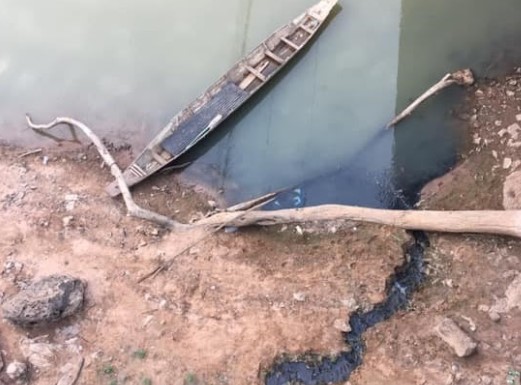
Community Waste Water directly discharged into Chi river
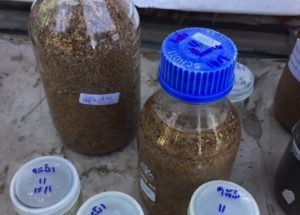
Sample of Chi river sediment
|
Microplastic in Chi River
Microplastics are a major cause of aquatic contamination in recent times. It is an important anthropogenic pollutant. Microplastics could be transferred from ecosystem to human body through food and water as evidence from their contamination in human excreta. It is important to understand microplastic contamination in surface water. An important source of microplastic in surface river is domestic wastewater. Chi River is the longest river in Thailand providing protein sources for millions of people. It is also a part of Mekong river basin. We have monitored microplastics contamination in the river basin both in water body and sediment from head to the end. Density, colour and functional group of microplastic samples were analyzed to identify source of microplastics polluted in Chi River. It was found that microplastics in Chi River were of both primary and secondary type. Primary microplastics were mostly from domestic wastewater and secondary type was from fishing net and plastic waste along the river. This microplastic in water might be able to enter food chain through fresh water plankton and fishes as well. This study contributes to the growing evidence that microplastics contaminate surface water ecosystems. This is highly important because Chi River is the main protein sources for the people in the basin with the population of around 12 million. This will lead to future study and prevention approaches.
Dr. Jutamas Kaewsuk
Interview Link: xxxxxx (3 mins) |
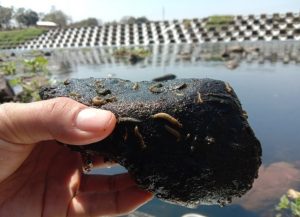
Hydropsychids (web- spinning caddisfly) located underneath rocks found in Pong River at Nampong District, Khonkaen Province
|
Microplastic ingested by macroinvertebrates inhabiting the upper Chi river, Northeastern Thailand
Benthic macroinvertebrates are organisms that live underwater in our streams and rivers, lack a backbone, and can be seen by the naked eye. This benthos plays an important functional role in energy transfer in food webs, linking basal food sources to upper trophic levels that include fish, birds, and humans. Based on their diversity and sensitivity to pollution, we gain an understanding of our streams’ health. In the present environmental concerns to beat plastic pollution, the understanding of microplastic ingested by the benthos will help us to fulfill the knowledge on microplastic in freshwater ecosystem, which is very scarce. Consequently, we are conducting our research focused on the microplastic ingested by different functional feeding benthos (i.e. predator, collector, shredder, piercer) in the Chi river, especially the upper watershed (i.e Chiyaphum to Maha Sarakham provinces) together with the sediment and water sampling. The samples will be collected two times covering the pre and post monsoon. The results of this research will explain the situation of microplastic pollution in freshwater and provide useful information to cope with the pollution.
Dr. Penkhae Thamsenanupap, Dr. Jatuporn Teanma and Dr. Tawatchai Thanee
Interview Link: xxxxxx (4 min) |
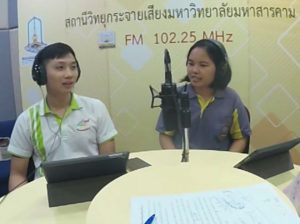
Talk about Plastic Pollution on “Environment for Community ” MSU Radio Channel
|
“Environment for Community” – Radio Channel
Mahasarakham University (MSU) conducts various activities in order to create awareness and remedy Environmental issues. One such activity is the radio channel “Environment for Community” that was conducted by the Faculty of Environment and Resource Studies. Keawta Laprom and Wanniwat Suthamrit, Master’s degree students from the Faculty of Science are the main speakers on this channel. Our program shares information on the topic of pollution. Recently, we talked about the issue of microplastics which is a detrimental material causing health hazards to both animals and humans. This material occurs as a result of anthropogenic activity combined with natural reactions. Therefore, we should reduce the use of plastic bags. Besides offering information related to Environmental issues, our channel also plays melodic songs to keep our listeners entertained.
Miss. Keawta Laprom and Mr. Wanniwat Suthamrit
|
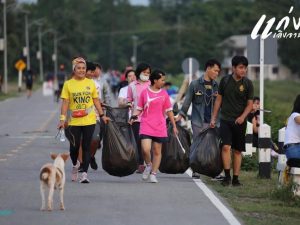
Plogging Team at MSU Running 2020
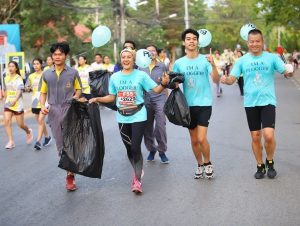
Plogging Team at the old campus
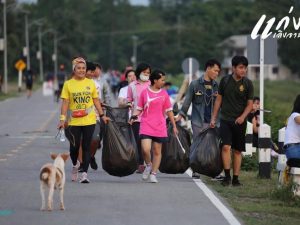
Plogging run near Kaeng Loeng Chan Lake
|
Plogging Mahasarakham
One pressing environmental concern in Thailand is the lack of awareness and initiative of Maha Sarakham’s citizens about the impacts of littering. This activity was initiated in Sweden and has garnered numerous attention across the globe. Plogging Mahasarakham is a part of No Plastic Campaign MSU.This is seen as a promising approach because the community gets to be involved in keeping their surroundings clean while doing leisure activity. Maha Sarakham plays a significant role in economical, political educational and cultural activities in the country and waste management is an important aspect in maintaining the economical, political, educational, and cultural importance of Northeast of Thailand. Unattended garbage, garbage on the street and uncovered bins not only degrade the aesthetic experience of visitors, they are the perfect breeding grounds for germs and pathogens, and end up killing the aquatic species in the Chi River. The approach to tackle the issue of garbage in Maha Sarakham is to get the community directly involved in keeping their city clean and creating awareness regarding the detriments of improperly disposed garbage. Plogging isn’t the only way to bridge the gap of the environmental policy, but creates a learning society where people can share their ideas and figure out ways to solve the community problem which is the key to sustainable development
Miss. Thanwarat Khonphian
|